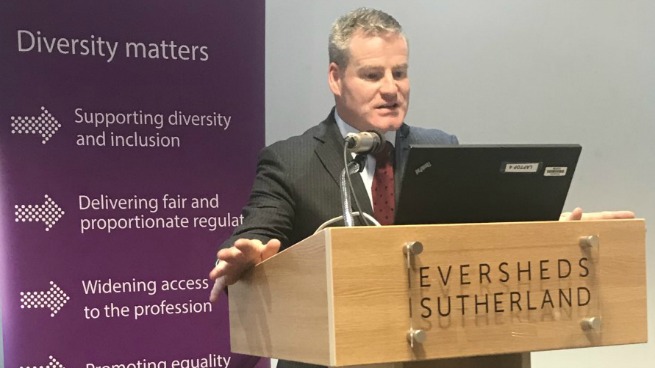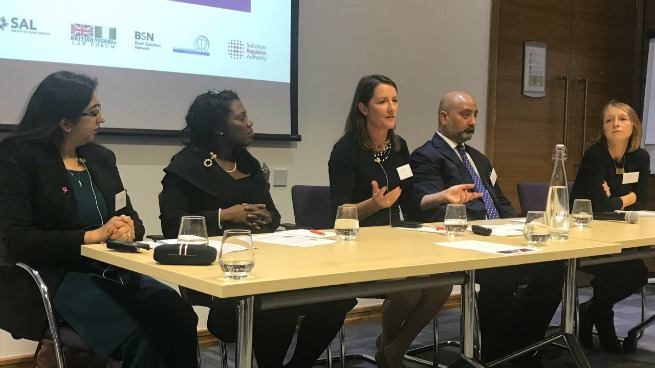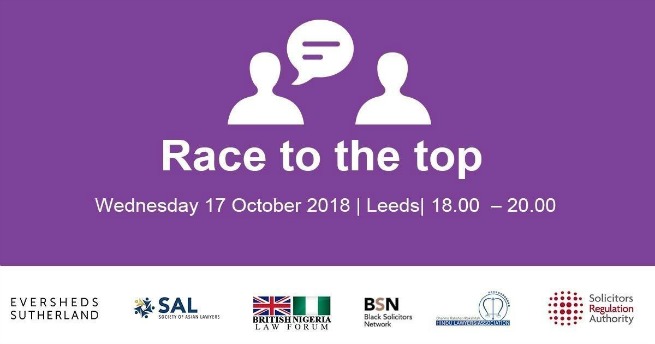Race to the top
Leeds, October 17th 2018
Race to the Top
Improving Diversity Within The Profession
The Society of Asian Lawyers welcomed members in the North of England to attend an SRA-led discussion on increasing BAME access to – and progression within – the legal profession.
SRA Executive Director (Operations), Robert Loughlin, explained certain reforms have been introduced (e.g. the single qualifying exam) but there was more to be done.
1 in 5 lawyers are from BAME backgrounds. Since 2007, there has been an increase in BAME lawyers by 4%, with more Asian than Black lawyers becoming practitioners. The sad reality is that a white male is six times more likely to become a partner in a firm than a BAME lawyer.
Chairing the panel discussion was SRA Board Member, Elaine Williams. Elaine worked in corporate law for 10 years and part of that time was spent in Asia. The panel shared their experiences and identified steps taken within their organisations to improve the culture of staff and levelling of the playing field for applicants.
All the ideas generated from this discussion are noted below. We hope you will inform your organisations and take action to implement some of these great suggestions. Together, we must push for change.
- Create opportunities to increase the visibility of BAME role models.
- Firms must offer more opportunities for good placements. (Eversheds Sutherland and Wincanton have started a joint initiative. They now offer a week’s placement in December. It is only available to BAME candidates and involves 3 days at the Birmingham ES office and 2 days at Wincanton, so if you are interested, please investigate and apply).
- Organisations need to become aware of unconscious bias and take steps to minimise it.
- Recruitment teams can run name-blind application processes and could even move to institution-blind application processes (as academics are less important than skill set).
- BAME lawyers should push forward by asking managers and employers for promotions, salary increases, better work and taking up opportunities to add value to their CVs.
- White middle class males need to be visible champions of increasing diversity, so we must invite them to participate in the diversity discussion.
- Successful BAME lawyers must help up those below them, not pull away the ladder.
- We all need to make the business case for diversity. Recently, a Harvard Study has identified that the most profitable companies have women on their boards.
- Management must change the culture of staff and get cultural nuances to shift to meet the demands of the business case.
- Language workshops are required so that people from disadvantaged backgrounds learn better ways of presenting themselves in applications and interviews for senior positions.
- Recruitment and interview panels need to be diverse to ensure that unconscious bias does not prohibit BAME candidates coming through the system and that BAME lawyers on these panels can “call out discrimination” when they see it happening.
- The SRA should put the statistics for gender pay gap and the equal pay gap together so that it highlights the very serious issue of female BAME lawyers experiencing the most discrimination.
- Positive discrimination is double edged. One panellist favoured it as a way of immediately redressing the problem, but others felt that having made it to the top of the profession, the last reason they wanted to be recognised for achieving their goal was simply because of the colour of their skin. Positive discrimination could work, if it was not about quotas but objectives.
- Statistics for discrimination should look inter-sectionally at organisations. For example, there may be more BAME lawyers than ever before but they are not at senior level and not in certain areas of law eg the chancery bar.
- More mentoring is needed.
- Diversity is not a one-off issue, it is a continuing issue and we must keep pressing for greater diversity.
- Change has to come from leadership at the top. We must work harder to reduce barriers; a simple classic error is hosting a networking drinks event during Ramadan.
- The professional regulatory bodies must force organisations to use name-blind recruitment.
The panellists for this event were:
Naeema Choudry, Partner at Eversheds Sutherland
- Specialist in employment law focusing on discrimination law
- Ambassador for Women on Boards
- Employment Tribunal Judge
Abid Mahmood, Barrister at No. 5 Chambers
- Recorder of the Crown Court
- Specialist in administrative law with a focus on human rights law
- Approved as a Special Advocate by the AG’s office to undertake national security cases
- Sits as a First Tier and Deputy Upper Tribunal Judge
Sally Penni, Barrister at Kenworthy Chambers
- Specialist in crime and employment law
- Founder of Women in Law
- Sits on various Boards and is passionate about women in business and leadership and has written about diversity related issues
Sam Smethers, CEO of the Fawcett Society
- Worked on the Equal Opportunities Commission and the Equalities and Human Rights Commission
- Nine years experience of working in Parliament
Our thanks are extended to all those who took part in this important discussion and also the other BAME organisations that supported this key event, BSN North, Hindu Lawyers Association and the British Nigeria Law Forum.
Chamali Fernando
Barrister & Committee Member of SAL



